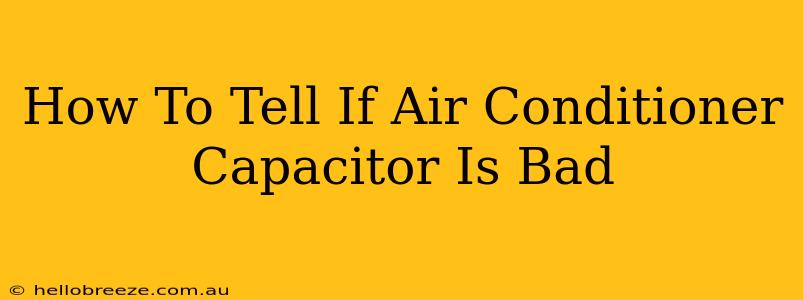Is your air conditioner struggling to start or running erratically? A bad capacitor could be the culprit. Capacitors are essential components in AC units, storing electrical energy to help the compressor start and run smoothly. Knowing how to identify a faulty capacitor can save you time, money, and potential frustration. This guide will walk you through the telltale signs of a bad AC capacitor, helping you diagnose the problem before calling a technician.
Common Signs of a Bad Air Conditioner Capacitor
Several symptoms indicate that your air conditioner's capacitor might be failing. Recognizing these signs early can prevent more significant problems and costly repairs.
1. Air Conditioner Won't Start
This is perhaps the most obvious sign. If your AC unit simply refuses to turn on, a faulty capacitor is a strong suspect. The capacitor provides the initial surge of power needed to get the compressor running. Without it, the compressor won't engage.
2. AC Compressor Runs Weakly or Intermittently
A capacitor that's failing may not provide enough power to the compressor. This results in the compressor running weakly, struggling to cool your space effectively, or cycling on and off intermittently. You might notice the unit making unusual noises or struggling to maintain its set temperature.
3. Humming Noise From the AC Unit
If you hear a loud humming sound emanating from your AC unit, especially when it's trying to start, it could signify a capacitor problem. This humming often indicates that the capacitor is struggling to store and release the necessary electrical charge.
4. Overheating of the Capacitor
Carefully check the capacitor itself. A bulging or unusually hot capacitor is a clear warning sign of imminent failure. Never touch a capacitor directly while the unit is powered on. A failing capacitor can store a dangerous electrical charge even after being switched off. Always disconnect the power before attempting any inspection.
5. Frequent Cycling
A bad capacitor can cause your air conditioner to cycle on and off repeatedly. This constant cycling not only reduces efficiency but also puts extra strain on other components of the system, potentially leading to more expensive repairs down the line.
Troubleshooting a Suspected Bad Capacitor
While you can visually inspect the capacitor for physical damage, diagnosing a bad capacitor requires caution and ideally a multimeter. Improper handling can result in electrical shock. If you are not comfortable working with electrical components, it's best to call a qualified HVAC technician.
Importance of Professional AC Repair
While identifying the symptoms of a bad capacitor is helpful, replacing it yourself involves working with potentially dangerous electrical components. Incorrect installation can lead to further damage or even injury. It's highly recommended to contact a qualified HVAC professional for diagnosis and repair. They have the expertise and tools to safely assess the problem and ensure the repair is done correctly.
Preventing Capacitor Failure
While capacitor failure can't always be prevented, proper maintenance can significantly extend their lifespan:
- Regular AC maintenance: Annual checkups by a professional can identify potential issues before they become major problems.
- Keep the unit clean: A clean AC unit runs more efficiently, reducing strain on components like the capacitor.
By understanding the signs of a bad air conditioner capacitor and knowing when to seek professional help, you can keep your cooling system running smoothly and efficiently throughout the summer. Remember, safety should always be your top priority. Don't hesitate to call a qualified HVAC technician if you suspect a problem with your AC unit.

